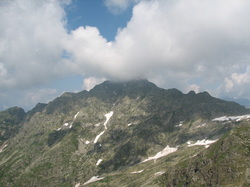 Life is mysterious. The older I get and the more I learn, the more I realize how much I don’t know. However, I suppose that this realization is a good thing because it forces me to acknowledge that I need help and therefore I must rely on God more. I know that I am not alone in this feeling. Life is so mysterious and confusing at times that maybe we might think that if only we were like Moses with the cloud of God’s presence descending upon us, then we might be able to figure things out better; if only we could converse directly with God and be totally clear about what it is we are trying to work out. That is not how it is for us, however. And anyway, I doubt Moses was crystal clear in understanding everything God said to him either. But no matter, part of being human is the struggle to make the right choices, to cope with things that seem overwhelming, and to know how to live in the midst of that which is beyond our ability to understand. “If only,” we wish, “we had wisdom so we could see things more clearly.” The Good News is that we do have wisdom and we do have access to God. While we will never have 100% certainty of most of our decisions in this life, we were given the gift of wisdom when we were confirmed and we have access to God at all times through prayer. Difficult choices do not go away when we pray, but we can turn to God and ask for His assistance in gaining some insights or simply the ability to be at peace with a situation, entrusting it into His care. The Bible is full of stories of people begging God to help them in times of trouble so that they know which way to turn or how to understand a situation which is beyond them. Therefore it seems to me that needing God’s help is not unique to our generation. It is part of the human condition that we struggle with the unknown or with a situation that may feel insurmountable. 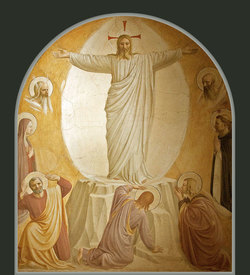 This week we celebrate the Feast of the Transfiguration. What struck me as I reflected on this wonderful feast is that wisdom was present during this event. And it is seen as such in all of the renditions told in the synoptic gospels. No matter which of the versions we read, the facts of the story remain: Jesus took his three closest apostles/friends, Peter, James, and John, up Mt. Tabor to pray with Him. Once up the mountain, Jesus changed in appearance, becoming radiant with light, and was seen conversing with Moses and Elijah. Meanwhile a cloud descended upon them and out of the cloud a voice was heard, that of the Father, saying: “This is my beloved Son. Listen to Him.” Then the entire scene evaporated “and Jesus alone was standing with them [the apostles].” (Mark 9) The cloud which appeared and descended upon them was the Shekinah, which is the protective, glorious presence of the Spirit of God, also associated with wisdom. Jesus was revealed as the Son of God standing in the midst of the cloud, the voice of the Father came forth from the cloud, and the cloud itself was the Shekinah, God’s Holy Spirit. The manifestation of the Shekinah was nothing really new. Throughout the Old Testament the Shekinah was visible at times, such as when the pillar of fiery cloud led the people from Egypt into the Promised Land. The guidance of that cloud can be seen as Wisdom, in that it was not really Moses who was guiding the people, it was the glorious Spirit of God. It was the same glorious Spirit of God, Wisdom, which was seen on Mt. Tabor when Jesus transfigured in front of His three friends. 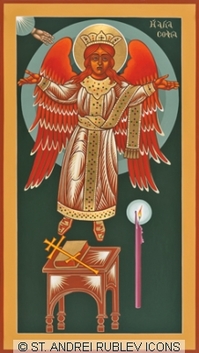 In the Transfiguration we see that even Jesus had to be immersed in the Spirit’s wisdom in order to know that it was time to fulfill His mission. Though He was God, and wanted to reveal this to the three witnesses who were His closest friends, He was also fully human and needed the Wisdom of God to direct Him. In short, it may be said that one reason Jesus went up the mountain was to converse with God to find out if the time was right for Him to fulfill His mission. I say this because Luke’s gospel tells us that Moses and Elijah spoke with Jesus of “His exodus that He was going to accomplish in Jerusalem,” confirming that it was time to go there to die and rise. Also, soon after Jesus came down from the mountain Luke says: “…He resolutely determined to journey to Jerusalem.” (Luke 9:51) The Wisdom of God gave Him the direction He sought. If Jesus needed to consult with the Spirit, then it should not surprise us that we need this, too. And while we do not need to climb Mt. Tabor in order to hear God’s word, we do have similar access to it. We have the gift of intimacy with God because we have the ability to pray. This gift needs to be developed; just as Moses did not go up the mountain and become enveloped in cloud upon his first meeting with God, we need to grow in relationship with God through our prayer. But our access to the Wisdom of God is no less than his or even that of Jesus. We can approach God any minute of the day or night and He is there. We also have access to the Wisdom of God through the Scriptures and the sacraments. While we receive the gift of wisdom at our Confirmation, we have the Eucharist offered continually in which we can immerse ourselves in the presence of Jesus and therefore have access to Wisdom. 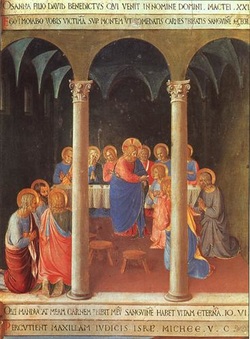 The Eucharist is what we are offered in this Sunday’s gospel. Jesus reminded His followers that God gave their ancestors “bread from heaven to eat” and that God was giving them bread from heaven again. This was lasting bread because it was the Body of Christ which was being offered to them. And it is in this bread that we have access to the Wisdom of God. It is in the Eucharist that all time seems to stop, just as at the Transfiguration, and all are united as one. It is the great equalizer, so to speak: there is no longer male or female, Greek or Jew, slave or free, as St. Paul says in his letters. Everything converges into a unity that is found nowhere else in the world and at no other time except when we come together in the Eucharist. Therefore it is in the Body of Christ that we have fullest access to the wisdom, power, mercy, and love of God. The Eucharist becomes our Shekinah, the glorious, protective presence of God. It is the cloud, so to speak, into Whose midst we are enveloped. When we receive the Eucharist we are present with Moses on the mountain, we are present as the manna rains down, when Jesus is transfigured, when He gives us His body and blood at the Last Supper, when He dies on the cross and when He is gloriously resurrected. We are present as one body in the Eucharist and so all our joys and blessings, pains, suffering, woundedness, brokenness, uncertainty, loneliness, grief, questions, doubts, and fears are also joined together with Him. We bring all of who we are into the Eucharist and into the Shekinah, the glory and protection of God. And we are transfigured in this experience, even if after we receive we seem to be alone as the apostles found themselves after Jesus’ transfiguration ended. Afterward they were still with Jesus as they always knew Him, and so too are we. 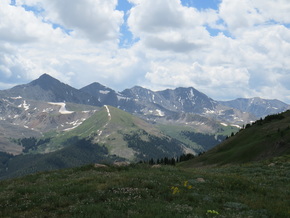 We need to trust that even though we do not feel like we have gained any extraordinary wisdom after we pray or after we receive the Eucharist, we have indeed been changed. We rely upon each encounter with the Living God as a source of strength and of trust. We put our cares and our worries, as well as our gratitude, into His hands. And if all has been given into His care, His wisdom will indeed guide us. If we make a decision based on thoughtful reflection and prayer, and then act in love doing the best we can with what we have, or if we are struggling to be at peace in a world filled with so much mystery which overwhelms us with confusion or suffering, we must keep praying that we may trust in His promise that He is with us, that He loves us, and that He will never leave our side or the side of those for whom we pray. If we can trust in Holy Wisdom given to us through the Eucharist, if we can trust in God’s love and mercy, we can live with the uncertainty of being human while leaning on the presence of God. God never promised us a pain free life, but He did say He would always offer us His love and His presence. Let us take Him up on His offer. May we come to know Holy Wisdom by entering into prayer! May the gifts we have been given in the sacraments be enlivened! May we trust in God’s protective and merciful presence with us! May we entrust our cares and concerns to the Lord who is ever by our side! May we be witnesses to the wisdom and love of God through our love of others! May we feel welcomed at the Eucharistic table and come to know we are indeed one in the Lord! And may we be transfigured with Jesus as we seek to grow in holiness, that we may glorify Him by our lives! Let us continue to meet in the heart of Jesus where all wisdom and love dwells. Peace! ©Michele L. Catanese Note: The Book of Wisdom is filled with beautiful passages about what wisdom is like and has some lovely prayers for wisdom. I recommend reading this book to reflect upon the description of wisdom contained in it. An example of a prayer one might take from the book is this: “Give me wisdom, the attendant at your throne and reject me not from among your children…. Send her forth from your holy heavens and from your glorious throne dispatch her that she may be with me and work with me, that I may know what is your pleasure.” (Wisdom 9:4,10) The first photo is mine. It was taken in northern Italy near Oropa. I was on Mt. Mucrone facing one of the small mountains nearby. Next is a painting Bl. Fra Angelico, The Transfiguration. Next is an icon by Fr. William Hart McNichols called Hagia Sophia (Holy Wisdom) It can be found at http://www.fatherbill.org/all-categories/product/282-hagia-sophia Next is another painting by Bl. Fra Angelico who is obviously one of my favorite painters: Communion of The Apostles. It can be found at http://www.wikiart.org/en/fra-angelico/communion-of-the-apostles-1452 The last photo is one of mine. It was taken atop Copper Mountain, a view of the surrounding mountains. (Dear Friends, The links are live now. Thanks for your patience if you had any trouble with them.) Comments are closed.
|
Heart Speaks to Heart
|

 RSS Feed
RSS Feed

